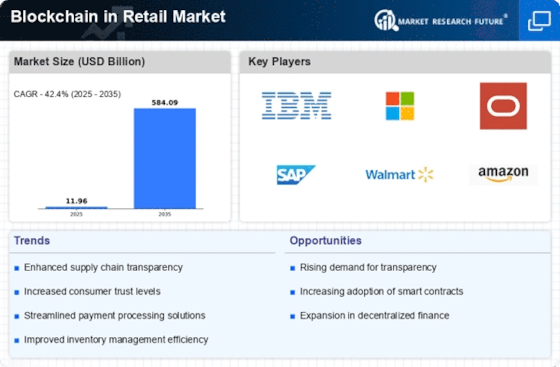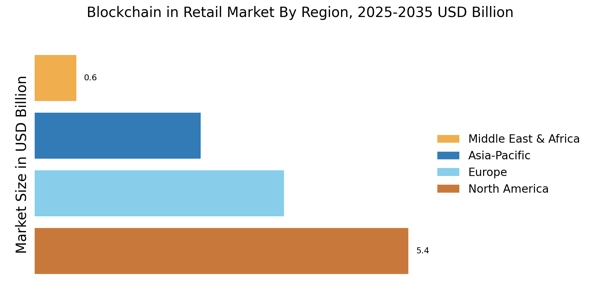Research Methodology on Blockchain in Retail Market
1. Introduction
Blockchain technology has been playing an important role in the retail sector, creating new opportunities for the sector and allowing businesses to run more efficiently, securely and cost-effectively. To make sure the business remains ahead in the rapidly evolving market, it is important to understand the current scenario of blockchain technology and its impact on the retail sector. This research paper attempts to provide an in-depth analysis of the current status of blockchain in the retail sector.
2. Overview of the Research
This research paper will attempt to analyze current trends in the blockchain field and the impact of the trend on retail operations. The paper will focus on the areas of efficiency, scalability, security, and cost-effectiveness. This research explores various aspects of blockchain technology and its impact on the retail industry.
The data collection methods used are exploratory and secondary research. This study makes use of secondary research to understand the trends, current market size and potential of the blockchain in retail. To get a comprehensive picture, qualitative data from interviews and surveys are collected from major players in the industry such as retailers, software providers and blockchain experts.
The research methodology for this study would include a combination of quantitative and qualitative research methods to generate the most accurate and up-to-date findings.
3. Target Audience
This research report would be useful for business owners and investors looking to understand the potential of blockchain technology in the retail sector and make better-informed decisions. It would also be helpful for technology developers and software providers interested in developing blockchain-specific solutions to retail needs.
4. Objective of the Research
The primary objective of this research would be to analyze the current status of blockchain technology in the retail sector, how it is utilized and identify the areas where it provides the highest value. Furthermore, this report will also evaluate the potential of blockchain across different sectors and provide insights into the opportunities and challenges for stakeholders and businesses.
The research report also intends to identify the barriers and drivers that are slowing down or accelerating the adoption of blockchain technology in the retail sector. The research also assesses the performance of existing blockchain-based solutions that are currently being utilized in the sector.
5. Research Question
The following research questions have been formulated in order to best answer the research objectives:
- What is the current status of blockchain technology in the retail sector?
- How is the technology being utilized by retail businesses?
iii. What are the areas of efficiency and security that blockchain technology provides?
- What are the potential opportunities and challenges of blockchain technology in the retail sector?
- What are the current and emerging trends in blockchain technology in the retail sector?
- What are the barriers and drivers of blockchain adoption in the retail sector?
6. Research Methodology
The research methodology for this study is comprised of three parts: 1) Secondary Research, 2) Exploratory Research and 3) Qualitative Research.
Secondary research are used to study the current market size of blockchain in the retail sector and get an understanding of the available technology. It is also used to assess the performance of existing blockchain-based solutions that are being utilized in the sector. The secondary research include desk-based research and industry reports.
Exploratory research are conducted using interviews and surveys to collect data to answer the research objectives. These qualitative data provide insights into the operations, benefits and challenges of existing blockchain-based solutions in the retail sector.
Qualitative research is used to get an in-depth understanding of the trends, potential and opportunities in the sector. This type of research is conducted through interviews and surveys with sector executives, technology experts, software providers, blockchain developers, retailers and analysts.
7. Sampling
A combination of non-probability and probability sampling techniques are used. Non-probability sampling techniques allow the selection of subjects based on the researcher’s judgment, i.e. convenience sampling, snowball sampling and quota sampling. Probability sampling techniques will also be used to get a representative sample of the population, i.e. stratified sampling, cluster sampling and systematic sampling.
8. Data Collection
For primary data collection, the following tools will be used:
- Interviews – Structured and unstructured interviews will be conducted with executives from different sectors, blockchain experts, software developers, consultants and technology vendors.
- Surveys – Online surveys will also be used to collect data from retailers, customers, industry analysts and blockchain experts.
For secondary data collection, the following sources will be used:
- Market Research Reports
- Industry Journals and Publications
iii. Industry Conferences and Events
- Government Documents
- White Papers
- News Articles
9. Data Analysis
The collected data is analyzed qualitatively and quantitatively. Quantitative analysis will include descriptive statistical analysis, correlation analysis, and regression analysis. The qualitative analysis will include content analysis, theme analysis and exploratory factor analysis.
10. Ethical Considerations
This research paper has laid down several ethical considerations that must be taken into account throughout the research process. The researcher must ensure that consent is obtained from the participants, data is collected and stored safely, and research findings are presented objectively. Furthermore, the researcher must also ensure that confidentiality is maintained and the research is undertaken following the guidelines of the relevant institution.
11. Conclusion
This research paper has provided an overview of the research methodology to be used to analyze the current status of blockchain technology in the retail sector, explore the opportunities and challenges of implementing blockchain solutions in the sector and understand the potential of the technology. By following the proposed research methodology, the most accurate and up-to-date data can be collected and analyzed to generate reliable findings and conclusions.


















